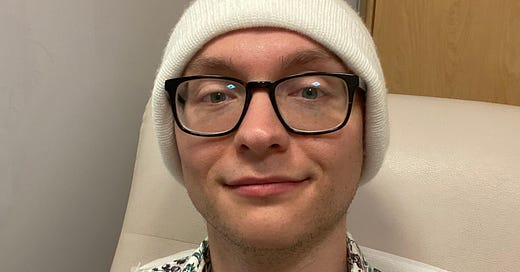It started with a lump in my neck.
That’s often the first question people ask me when they find out: “How did you know?”
Within five minutes I’ll see them run their hands over their own neck, not always consciously.
I don’t blame them. When you hear about someone close to you—or with your demographic profile—getting cancer, you want to double check yourself. I remember the feeling. It’s like the enemy has breached the city gates, and night has fallen. You’re suddenly alert, and ready to confront disaster.
My particular cancer is Hodgkin’s lymphoma, a blood cancer that affects lymphocytes (white blood cells).
The prognosis is good. So far, there is every reason to expect a full cure. I had my final dose of chemotherapy on December 26, 2023, but I still have to get a final scan in February to confirm that the cancer is gone. After that, assuming the cancer is gone, I enter extended monitoring for years.
After the enemy is gone, the sentinel still keeps his station.
I’m writing about this season of life partially because I can’t help myself—I write about everything—but also to return the favor that others did for me.
I’ve fared well psychologically throughout all of this because I’d already followed great writers through their experiences with cancer. Caitlin Flanagan has written extensively, beautifully, and sharply about her breast cancer in The Atlantic. Ben Ryan, an independent science journalist, brought a “doctor operating on himself” air to his two rounds of cancer.
I loved reading both of their writing before I really even knew what Hodgkin’s lymphoma was. By the time I did, I had their experience to rely on. I don’t know either of them personally, but that’s the wonderful thing about writing: any human can live a thousand lives by reading enough of it.
So I’m adding to the vast catalog of cancer prose. I likely won’t have anything original to add to it, but originality is overrated:
Humans have rediscovered the same ideas for millennia, and the thing you want to write about has likely been written about somewhere by someone. But that doesn’t really matter. The real question isn’t “who wrote it?” but “who read it?” Not “has it been written?” but “has it been read?”
Almost no one has read Aristotle, nor will they under any circumstances, but he’s got a lot of good ideas. If you write about those same ideas, there’s a good chance you’ll be introducing them to an audience that wouldn’t have otherwise thought about them—and certainly not in the manner inflected by your personality, life context, and writing style.
Some of you who read this piece might end up with your own cancer down the line.
When that happens, I hope you remember what I have, and will, write about my own experiences.
This is for you.





Thanks for your very kind words! I really never had any idea that things I said in public about fighting cancer would mean much to people. I first started doing it because I was raising money for a charity and figured it would be a good way to grab people’s attention! I got a lot out of the kind things people said. I hope you’ll keep writing about your experience and that you recover well from treatment. It’s a damn battle.
Daniel, I go on Facebook about once a year just to get it out of the way and fulfill my yearly obligation to "stay current." I am so very grateful that I found you there, now, and read about your journey. I have such vivid and wonderful memories of our conversations about a thousand years ago. I wish you all the health and strength you have to come through the coming months and the many years ahead for you. Blessings - Patricia